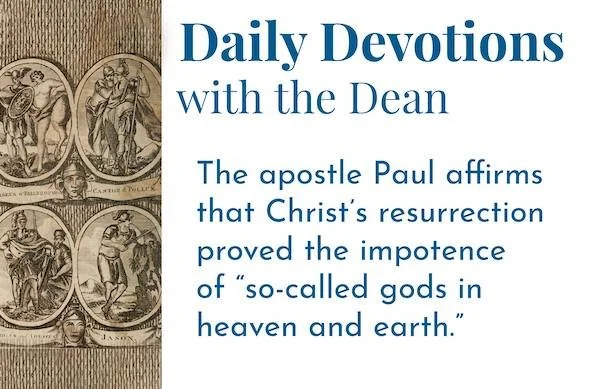Wednesday • 10/4/2023 •
Wednesday of the Eighteenth Week After Pentecost (Proper 21)
This morning’s Scriptures are: Psalm 101; Psalm 109; 2 Kings 18:9–25; 1 Corinthians 8:1–13; Matthew 7:13–21
This morning’s Canticles are: following the OT reading, Canticle 11 (“The Third Song of Isaiah,” Isaiah 60:1-3,11a,14c,18-19, BCP, p. 87); following the Epistle reading, Canticle 16 (“The Song of Zechariah,” Luke 1:68-79, BCP, p. 92)
Welcome to Daily Office Devotions, where every Monday through Friday we ask how God might direct our lives from that day’s Scripture readings, as given in the Book of Common Prayer. I’m Reggie Kidd, and I’m grateful to be with you. This Wednesday in the Season After Pentecost our readings come from Proper 21 of Year 1 in the Daily Office Lectionary.
1 Corinthians: “love” versus “knowledge”
I’ve only known a few people who live in fear of oppressive spiritual forces, fewer still who know the joy of being liberated from them by Christ. The conceit of modernity is to have banished God from the heavens and the devil from hell, leaving us alone in the universe (apart, perhaps, from UFO, or UAP, that is, Unidentified Anomalous Phenomena sightings).
It wasn’t this way in Paul’s day. The heavens were filled with beings who could help you or harm you. One of the chief ends of religious observation was to enlist good powers to your aid, and to ward off evil dominions and authorities. In his letters to the Colossians and the Ephesians, Paul tackles these issues head on, assuring believers that Christ is their Champion and that he has defanged hostile powers (see especially Colossians 1:15–20; 2:15; Ephesians 1:20–23).
Image: Internet Archive Book Images, No restrictions, via Wikimedia Commons
Some, but not all, Corinthian believers have gotten the message loud and clear. Christ’s resurrection has proved the impotence, indeed the nothingness, of “so-called gods in heaven and earth.” This is a liberating knowledge for these Christians, and Paul affirms them in it: “[Y]et for us there is one God, the Father, from whom are all things and for whom we exist, and one Lord, Jesus Christ, through whom are all things and through whom we exist” (1 Corinthians 8:6).
One implication of this wonderful reality is that for Paul (and Corinthian believers with liberated consciences), marketplace meat that had previously been consecrated to pagan deities no longer carried the stench of idolatry. That taint disappeared with Christ’s resurrection. Now, it’s just meat, part of a good God’s created order, and a gift for our enjoyment and nourishment. As Paul will write later in 1 Timothy 4:4–5, “For every creation of God is good and no food is to be rejected if it is received with thanksgiving. For it is sanctified by God’s word and by prayer” (New English Translation).
Not all members of the Corinthian church, though, have come to this realization. For them, the smell of idolatry still clings to meat that had been consecrated to pagan deities prior to being brought to market. Paul is more disappointed to find out that the “liberated” Corinthians lovelessly flaunt their “knowledge” in the face of their unenlightened brothers and sisters than he is that the conscience-stricken believers don’t know enough about the radical freedom that Christ has bought for them: “‘Food will not bring us close to God.’ We are no worse off if we do not eat, and no better off if we do. 9 But take care that this liberty of yours does not somehow become a stumbling block to the weak. … [B]y your knowledge those weak believers for whom Christ died are destroyed. 12 But when you thus sin against members of your family, and wound their conscience when it is weak, you sin against Christ” (1 Corinthians 8:8–12).
For Paul—and here’s the lesson for us—love eclipses knowledge: “Knowledge puffs up, but love builds up” (1 Corinthians 8:1b). As he will write later in this letter in a related context, that of Communion, we are supposed to “wait for one another” (1 Corinthians 11:33c). Waiting for one another means not just making sure that everybody gets Communion before the service proceeds, it means making sure that progressive consciences don’t trample on traditionalist consciences.
We’re not to be the people who grow up in strict temperance homes who discover “Christian liberty,” and then insist on indulging our new-found enjoyment of “adult beverages” in the face of recovering alcoholics. We’re not allowed to let “knowledge” trample on “love.”
We’re not to be the people who embrace new theological insights (whether it’s the discovery of rich sacramentalism, or the ultimate solution for reconciling God’s sovereignty and human free will, or a satisfying approach to the end times), and then scoff patronizingly at supposed dullards who believe what we used to believe, or who are still mired in confusion or ambiguity or apathy.
Over the next several chapters of 1 Corinthians, Paul lays out his desire that we sublimate our rights for the sake of serving one another (especially 1 Corinthians 9), that the powerful and the “important” people make room for the powerless and the “unimportant” (especially 1 Corinthians 11), that we learn to revel in the diversity of gifts in the Body (especially 1 Corinthians 12), and that, above all, we learn the way of love (especially 1 Corinthians 13), where love, as regards one another, “bears all things, believes all things, hopes all things, endures all things” (1 Corinthians 13:7).
Such “love” is itself the most convincing proof of the “knowledge” we have of Christ’s preeminence over all “so-called gods.”
Be blessed this day,
Reggie Kidd+


